| |||||
| Decades: | |||||
|---|---|---|---|---|---|
| See also: | Other events of 1946 List of years in Albania | ||||
The following lists events that happened during 1946 in the People's Republic of Albania .
| |||||
| Decades: | |||||
|---|---|---|---|---|---|
| See also: | Other events of 1946 List of years in Albania | ||||
The following lists events that happened during 1946 in the People's Republic of Albania .
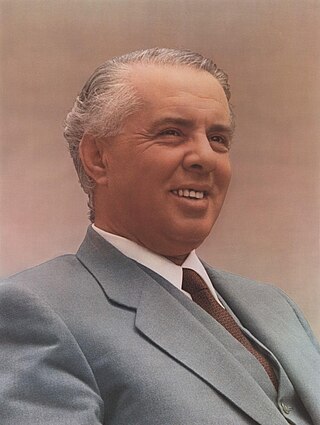
Enver Hoxha was an Albanian communist politician who was the ruler of Albania from 1944 until his death in 1985. He was the First Secretary of the Party of Labour of Albania from 1941 until his death, a member of its Politburo, chairman of the Democratic Front of Albania, and commander-in-chief of the Albanian People's Army. He was the twenty-second prime minister of Albania from 1944 to 1954 and at various times was both foreign minister and defence minister of the country.

The prime minister of Albania, officially the prime minister of the Republic of Albania, is the head of government of Albania. The office of the prime minister is a core institution in the politics of Albania formed after the Albanian declaration of independence on 28 November 1912. Since that time, the nation has navigated a dynamic political evolution spanning distinct periods, encompassing a monarchy, a communist regime and the eventual democratic order. In 1912, Ismail Qemali was inaugurated as the first prime minister of Albania, guiding the nation toward sovereignty amidst the complex conditions in the Balkans. In 1944, Enver Hoxha implemented a radical change in government, transforming Albania into an authoritarian and isolationist communist regime. In 1991, the nation transitioned into a democracy that marked a notable shift, when Fatos Nano emerged as the first post-communist prime minister of Albania.

Nexhmije Hoxha was an Albanian communist politician. For many years she was the wife of Enver Hoxha, the first leader of the Socialist People's Republic of Albania and the First Secretary of the Party of Labour of Albania. Very close to her husband, she attempted to remain politically influential after his death in 1985. She was one of the few spouses of a ruling communist party leader with a high political profile of her own.
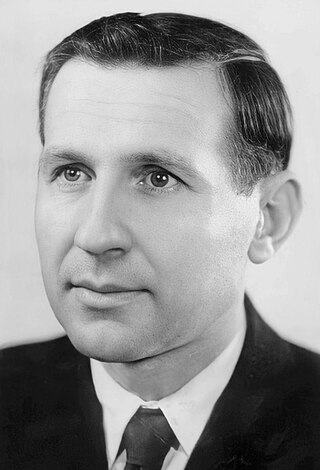
Mehmet Ismail Shehu was an Albanian communist politician who served as the Prime Minister of the People's Socialist Republic of Albania from 1954 to 1981. He was known as a close confidant of Enver Hoxha and served in various high-ranking positions in the government.

The Party of Labour of Albania (PLA), also referred to as the Albanian Workers' Party (AWP), was the ruling and sole legal party of Albania during the communist period (1945–1991). It was founded on 8 November 1941 as the Communist Party of Albania but changed its name in 1948. The party was dissolved on 13 June 1991 and succeeded by the Socialist Party of Albania and the new Communist Party of Albania. For most of its existence, the party was dominated by its First Secretary, Enver Hoxha, who was also the de facto leader of Albania from 1944 until his death in 1985.
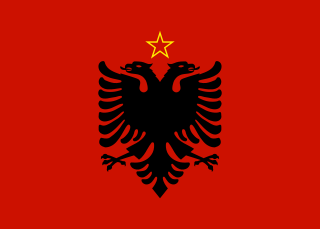
The People's Socialist Republic of Albania, officially the People's Republic of Albania from 1946 until 1976, and from 1991 to 1992 as the Republic of Albania, was the communist state in Albania from 1946 to 1991. It succeeded the Democratic Government of Albania (1944–1946).
The fall of communism in Albania, the last such event in Europe outside the Soviet Union, started in December 1990 with student demonstrations in the capital, Tirana, although protests started in January that year in other cities like Shkodra and Kavaja. The Central Committee of the communist Party of Labour of Albania allowed political pluralism on 11 December and the largest opposition party, the Democratic Party, was founded the next day. March 1991 elections left the Party of Labour in power, but a general strike and urban opposition led to the formation of a "stability government" that included non-communists. Albania's former communists were routed in elections in March 1992 amid economic collapse and social unrest, with the Democratic Party winning most seats and its party head, Sali Berisha, becoming president.
Parliamentary elections for a Constituent Assembly were held in Albania on 2 December 1945. Voters were presented with a single list from the Democratic Front, organized and led by the Communist Party of Albania. The Front won all 82 seats.

Beqir Balluku was an Albanian politician, military leader, and Minister of Defense of Albania. Balluku assisted Enver Hoxha in carrying out the 1956 purge within the Party of Labour. However, in 1974, Balluku himself, along with a group of other government members was accused by Hoxha of an attempted coup d'état against the Albanian People's Republic. He was executed the next year.
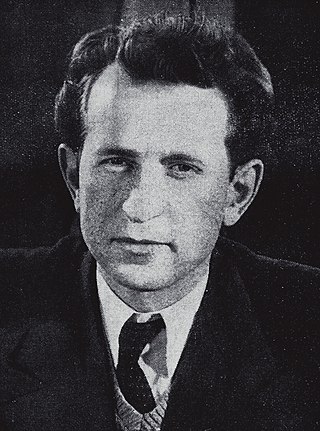
Tuk Jakova was an Albanian politician in the People's Republic of Albania. He served as Chairman of the Constituent Assembly, Minister of Finance, Minister of Interior, and twice as Vice-Prime Minister.

The Democratic Government of Albania also known as the Hoxha I Government was established on 20 October 1944 by the National Liberation Movement, as the Albanian partisan resistance of 1940–1944 came to a close. A provisional government took power after the liberation of the country from German forces on 28 November. Its interim Prime Minister was Secretary-General Enver Hoxha of the Communist Party of Albania. The interim government was to be in existence until the holding of elections and the convening of a Constituent Assembly.
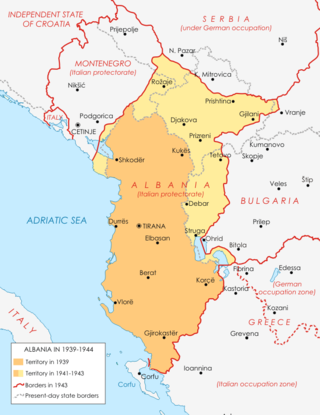
Liberation Day in Albania is commemorated as the day, November 29, 1944, in which the country was liberated from Nazi Germany forces by the Albanian resistance during World War II.
Bedri Spahiu was an Albanian politician and Lieutenant-General and one of the most prominent figures of the Albanian Labour Party up to 1956.
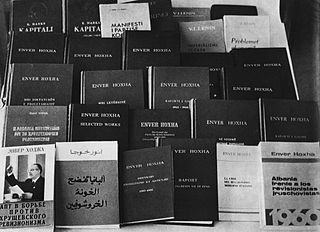
Hoxhaism is a variant of anti-revisionist Marxism–Leninism that developed in the late 1970s due to a split in the anti-revisionist movement, appearing after the ideological dispute between the Chinese Communist Party and the Party of Labour of Albania in 1978. The ideology is named after Enver Hoxha, First Secretary of the Party of Labour from 1941 to 1985 and leader of Albania from 1944 to 1985.

Athanas Spiru, known as Nako Spiru, was an Albanian politician and high-ranking official of the Communist Party of Albania (PKSh). He served as Minister of Economy and Industry from 1946 until his untimely death the following year.

Kadri Hazbiu was an Albanian politician of the Albanian Party of Labour (PPSh).

Xhafer Spahiu was an Albanian politician of the Albanian Party of Labour (PPSh). He was the only Kosovar Albanian of the higher ranks of the Communist Albania leadership after 1948.
The following lists events that happened during 1944 in the People's Republic of Albania.
The following lists events that happened during 1945 in the People's Republic of Albania.

Diplomatic relations between Albania and North Korea were established on November 28, 1948, over one and a half months after the DPRK was proclaimed. The communist governments of Enver Hoxha and Kim Il Sung were often compared for their similarities in their diplomatic isolation and Stalinist-style regimes.